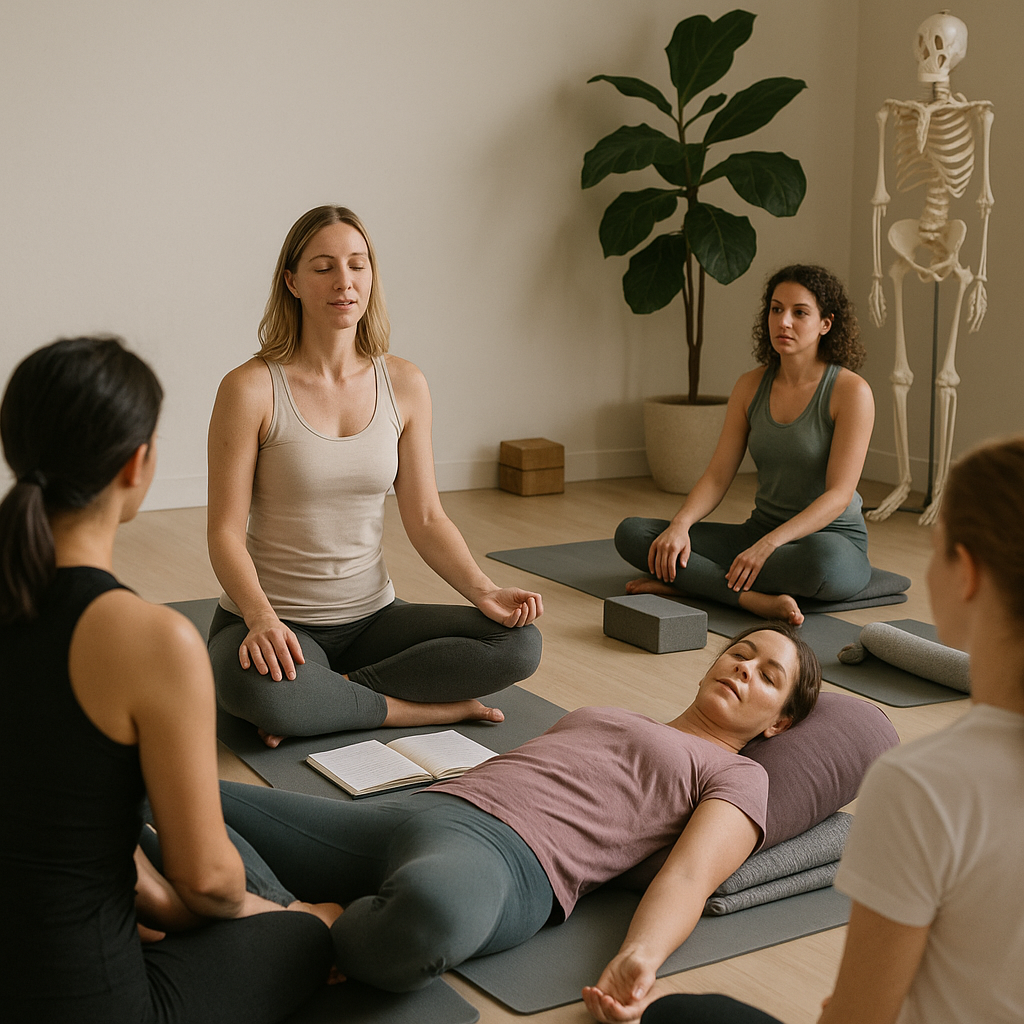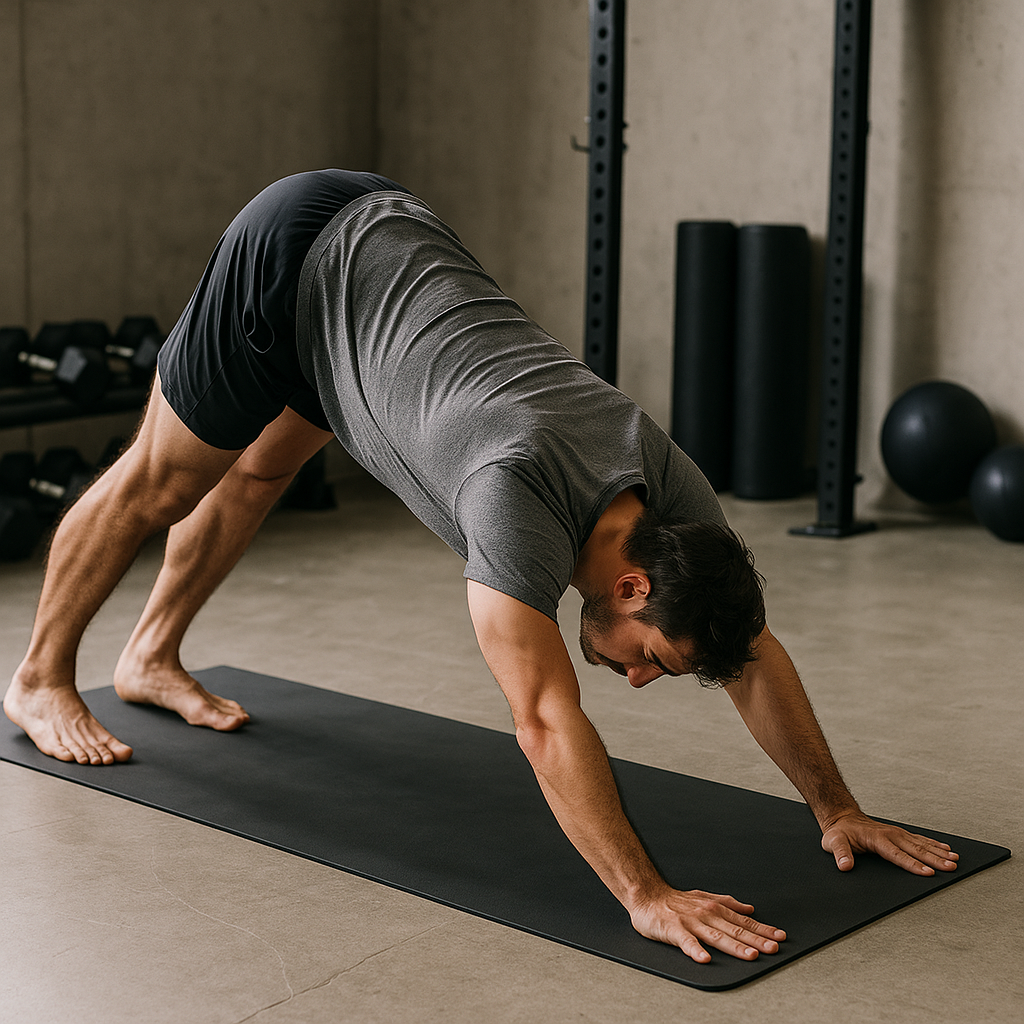Step 1: Understanding the Core of Yoga Teacher Training in India
India has become the global hub for immersive yoga education. Cities like Rishikesh, Goa, Mysore, and Dharamshala offer authentic courses that combine asana practice, philosophy, meditation, and anatomy into structured formats such as 200 Hour Yoga Teacher Training (200-Hr YTT).
These programs are recognized by Yoga Alliance and prepare participants to teach internationally. The foundation lies in:
Practical Asana Training: Hatha, Ashtanga, and Vinyasa practice with alignment and sequencing.
Philosophy & Texts: Study of Patanjali’s Yoga Sutras, Bhagavad Gita, and Upanishads.
Anatomy & Physiology: Functional understanding of movement and breath.
Meditation & Pranayama: Tools for inner balance.
Teaching Practice: Building confidence through peer-led sessions.

Step 2: Why Goa & Rishikesh Are Leading Destinations
When searching for Yoga Teacher Training in India, two names dominate: Rishikesh and Goa.
| Location | Why Choose It | Typical Vibe | Best For |
| Rishikesh | Considered the Yoga Capital of the World, authentic Himalayan ashram experience | Spiritual, traditional, ashram-based | Deep immersion, cultural experience |
| Goa | Relaxed coastal destination with modern facilities | Beachside, international crowd | Balance of retreat + training, diverse teachers |
👉 If you’re planning a Yoga Teacher Training Goa program, expect smaller batch sizes, beachside practice, and more Western-style accommodations compared to Rishikesh’s ashrams.
Step 3: Key Types of Courses Available in India
200 Hour Yoga Teacher Training
Duration: 21–30 days
Covers foundational techniques, philosophy, and anatomy.
Ideal for both aspiring teachers and serious practitioners.
Yin Yoga Teacher Training
Focuses on fascia release, long-held poses, and meditative stillness.
Complements dynamic styles like Vinyasa or Ashtanga.
Sound Healing Course
Integrates yoga with therapeutic use of Tibetan bowls, gongs, and chanting.
Often available as add-on workshops during Yoga Retreat Goa or Rishikesh programs.
Yoga Retreat 2025 Programs
Shorter (7–10 days), combining yoga with Ayurveda, meditation, and excursions.
Popular among travelers who want wellness without committing to certification.
Step 4: Daily Life During Teacher Training
A typical schedule in a 200-Hour TTC looks like this:
| Time | Activity |
| 06:00 – 07:30 | Pranayama & Meditation |
| 08:00 – 09:30 | Asana Practice (Hatha or Ashtanga) |
| 10:00 – 11:00 | Breakfast |
| 11:30 – 13:00 | Anatomy / Philosophy Lecture |
| 13:00 – 14:00 | Lunch |
| 15:00 – 16:30 | Teaching Methodology / Sequencing |
| 17:00 – 18:30 | Evening Asana or Yin Session |
| 19:00 – 20:00 | Dinner |
| 20:30 – 21:00 | Group Reflection / Chanting |
👉 Pro Tip: Pack a travel-friendly yoga mat, bug spray, and a scarf for cultural respect and practical use during classes.
Step 5: Practical Tips for Choosing a Program
-
Check Accreditation: Ensure the school is Yoga Alliance registered.
Batch Size Matters: 10–15 students per group allows more personalized attention.
Food & Accommodation: Simple vegetarian meals are standard. Some Goa schools include Ayurvedic options.
Hidden Costs: Factor in visa fees, flights, and local transport.
Add-On Courses: Many schools now combine Yin Yoga Teacher Training or Sound Healing course modules for extra certification.

Step 6: Costs Breakdown
| Course Type | Average Cost (USD) | Duration |
| 200 Hour YTT in Goa | $1200 – $2000 | 24–28 days |
| 200 Hour YTT in Rishikesh | $750 – $1500 | 28–30 days |
| Yin Yoga TTC | $600 – $1200 | 7–10 days |
| Sound Healing Add-On | $200 – $600 | 2–5 days |
| Yoga Retreat 2025 Goa | $500 – $1000 | 7–10 days |
👉 Goa is slightly more expensive due to its resort-style living, while Rishikesh remains budget-friendly.
Step 7: Advanced Options After 200 Hours
After completing your 200 Hour Yoga Teacher Training, you can progress to:
300 Hour Advanced YTT → For specialization in Ashtanga, Vinyasa, or Yoga Therapy.
Yoga Retreats → To refresh, recharge, and network with international practitioners.
Specialized Courses → Yin, Prenatal, Ayurveda, or Sound Healing Course certifications.
Step 8: Common Challenges and How to Handle Them
Overwhelm from Intensive Schedules
-
Solution: Prioritize sleep, keep a hydration routine, and don’t skip meals.
Cultural Adjustments in India
-
Solution: Embrace vegetarian meals, carry reusable bottles, and dress modestly.
Physical Fatigue
-
Solution: Use props, practice Yin yoga in downtime, and know your limits.
Navigating Options
-
Solution: Shortlist schools based on batch size, style, and reviews across multiple platforms.
Post-Training Confidence
-
Solution: Start teaching friends/family immediately, join online teaching communities, and continue workshops.
Step 9: FAQs
Q1: Can I join a Yoga Teacher Training Goa without prior yoga experience?
Yes, many schools accept beginners as long as you have a basic practice. However, consistency for at least 3–6 months before joining is recommended.
Q2: What’s the difference between a Yoga Retreat and a Teacher Training?
A retreat is relaxation-focused, while training involves intensive study, practice, and certification requirements.
Q3: Do I need to bring my own mat and props?
Most schools provide mats, blocks, and straps, but bringing your own lightweight mat ensures comfort and hygiene.
Q4: How can I integrate Yin Yoga Teacher Training into my 200 Hour program?
Many schools in Goa and Rishikesh offer Yin modules as optional extensions after the standard YTT.
Q5: What career options open up after completing Yoga Teacher Training in India?
You can teach in studios worldwide, lead retreats, specialize in wellness tourism, or create online yoga platforms.
And Finally… A Playful Wrap-Up
So, after weeks of bending like pretzels, chanting mantras you can barely pronounce, sipping endless masala chai, and discovering muscles you never knew existed—what do you get?
-
A certification that lets you teach globally.
-
A community of lifelong yoga friends.
-
A body-mind upgrade you didn’t know you needed.
And maybe, just maybe, the ability to finally nail that headstand without looking like a collapsing tripod.

Join our community to interact with posts!